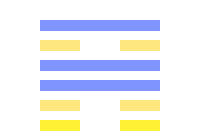56.1.3.4.6 (56 > 24)

56.1.3.4.6 (56 > 24) - THE LÜ HEXAGRAM.
- 1. The first line, divided, shows the stranger mean and meanly occupied. It is thus that he brings on himself (further) calamity.
- 3. The third line, undivided, shows the stranger, burning his lodging-house, and having lost his servants. However firm and correct he (try to) be, he will be in peril.
- 4. The fourth line, undivided, shows the traveller in a resting-place, having (also) the means of livelihood and the axe, (but still saying), ‘I am not at ease I in my mind.’
- 6. The sixth line, undivided, suggests the idea of a bird burning its nest. The stranger, (thus represented), first laughs and then cries out. He has lost his ox(-like docility) too readily and easily. There will be evil.
56.1.3.4.6 (56 > 24) - Lu, le voyageur
Lu : voyageur, hôte, étranger, loger ; bon arrangement.
- 1. Les étrangers ambulants, petits et faibles, sont exposés à bien des maux. [Quand le but est bas, les calamités s’ensuivent.]
-
3. Il arrive que cet étranger brûle sa maison, perde ses bons et intelligents serviteurs, sa prospérité est bien en péril. [Il brûle sa maison en se ruinant ; en fréquentant les gens vulgaires, il perd son habileté, sa rectitude.]
- 4. Il peut s’être établi quelque part, y avoir ses biens et sa hache, mais son cœur n’est point encore à l’aise et en sûreté. (Il n’a point une situation assurée, il doit veiller.)
- 6. L’oiseau détruit son nid ; l’étranger ambulant rit d’abord, puis pousse de hauts cris, parce qu’il perd son bœuf ; ainsi, trop aisément, un changement amène un mal.
56.1.3.4.6 (56 > 24) - Chercher
On reprend des habitudes que l'on avait perdues.
Bing DeepL Google Yandex56.1.3.4.6 (56 > 24) - Keresés
- 1. Ha valaki nagy veszteségeket szenvedett, nem engedheti el magát.
- 3. Ha elfeledkezik a közeliekről elveszíti őket.
- 4. Védi magát a többiektől, nem teszi jól.
- 6. Meggondolatlanság elfogadni megbeszélés nélkül.
The trigrams
The trigrams are combinations of three yin and yang lines. The three bottom lines of the hexagram form the lower trigram and represent the inner situation. The three top lines form the upper trigram and represent the outer situation.
Upper trigram: The fire The earth


Lower trigram: The mountain The thunder


The formation: 56
What is already there

56 - THE LÜ HEXAGRAM.
Lü intimates that (in the condition which it denotes) there may be some little attainment and progress. If the stranger or traveller be firm and correct as he ought to be, there will be good fortune.
Bing DeepL Google Yandex56 - Lu, le voyageur
Lu : voyageur, hôte, étranger, loger ; bon arrangement.
Lu « bon arrangement ». Avec un faible commencement, le bon arrangement conduit au succès, à la consolidation, au bonheur.
Texte
L’étranger ambulant prospère difficilement. S’il est juste et droit, il aura une heureuse fortune.
Symbolisme
Le feu au-dessus d’une montagne. Ainsi le grand et sage fait briller sa droiture en appliquant les lois pénales et ne laisse pas durer les différends et les procès.
Commentaire
Si le faible acquiert, maintient sa droiture chez les étrangers et reste soumis au fort, il sera stable et attaché à la claire vérité. Ainsi l’étranger nomade, faible au commencement, prospérera et s’affermira s’il est droit et juste.

56.1 (56 > 30) - THE LÜ HEXAGRAM.
The first line, divided, shows the stranger mean and meanly occupied. It is thus that he brings on himself (further) calamity.
Bing DeepL Google Yandex56.1 (56 > 30) - Coping
When one has suffered great losses, one must not let oneself go.
Bing DeepL Google Yandex56.1 (56 > 30) - Coping
When one has suffered great losses, one must not let oneself go.
Bing DeepL Google Yandex56.1 (56 > 30) - Lu, le voyageur
Lu : voyageur, hôte, étranger, loger ; bon arrangement.
Les étrangers ambulants, petits et faibles, sont exposés à bien des maux. [Quand le but est bas, les calamités s’ensuivent.]
Bing DeepL Google Yandex56.1 (56 > 30) - Tenir le coup
Quand on a beaucoup perdu, on ne doit pas se laisser aller.
Bing DeepL Google Yandex56.1 (56 > 30) - Keresés
Ha valaki nagy veszteségeket szenvedett, nem engedheti el magát.
Bing DeepL Google Yandex
56.3 (56 > 35) - THE LÜ HEXAGRAM.
The third line, undivided, shows the stranger, burning his lodging-house, and having lost his servants. However firm and correct he (try to) be, he will be in peril.
Bing DeepL Google Yandex56.3 (56 > 35) - Lu, le voyageur
Lu : voyageur, hôte, étranger, loger ; bon arrangement.
Il arrive que cet étranger brûle sa maison, perde ses bons et intelligents serviteurs, sa prospérité est bien en péril. [Il brûle sa maison en se ruinant ; en fréquentant les gens vulgaires, il perd son habileté, sa rectitude.]
56.3 (56 > 35) - Remettre sa démission
On oublie un proche alors on le perd.
Bing DeepL Google Yandex
56.4 (56 > 52) - THE LÜ HEXAGRAM.
The fourth line, undivided, shows the traveller in a resting-place, having (also) the means of livelihood and the axe, (but still saying), ‘I am not at ease I in my mind.’
Bing DeepL Google Yandex56.4 (56 > 52) - Losing legitimacy
When one defends oneself from others, one sees that things are not going well.
Bing DeepL Google Yandex56.4 (56 > 52) - Losing legitimacy
When one defends oneself from others, one sees that things are not going well.
Bing DeepL Google Yandex56.4 (56 > 52) - Lu, le voyageur
Lu : voyageur, hôte, étranger, loger ; bon arrangement.
Il peut s’être établi quelque part, y avoir ses biens et sa hache, mais son cœur n’est point encore à l’aise et en sûreté. (Il n’a point une situation assurée, il doit veiller.)
Bing DeepL Google Yandex56.4 (56 > 52) - Perdre sa légitimité
En se défendant des autres, on voit que ça ne va pas.
Bing DeepL Google Yandex
56.6 (56 > 62) - THE LÜ HEXAGRAM.
The sixth line, undivided, suggests the idea of a bird burning its nest. The stranger, (thus represented), first laughs and then cries out. He has lost his ox(-like docility) too readily and easily. There will be evil.
Bing DeepL Google Yandex56.6 (56 > 62) - Being light-headed
It is imprudent to accept without discussion.
Bing DeepL Google Yandex56.6 (56 > 62) - Being light-headed
It is imprudent to accept without discussion.
Bing DeepL Google Yandex56.6 (56 > 62) - Lu, le voyageur
Lu : voyageur, hôte, étranger, loger ; bon arrangement.
L’oiseau détruit son nid ; l’étranger ambulant rit d’abord, puis pousse de hauts cris, parce qu’il perd son bœuf ; ainsi, trop aisément, un changement amène un mal.
Bing DeepL Google YandexIn the making: 24
What is poised to happen

24 - THE FÛ HEXAGRAM.
Fû indicates that there will be free course and progress (in what it denotes). (The subject of it) finds no one to distress him in his exits and entrances; friends come to him, and no error is committed. He will return and repeat his (proper) course. In seven days comes his return. There will be advantage in whatever direction movement is made.
Bing DeepL Google Yandex24 - Fû, le retour
Fū : réparation, correction, amendement, retour à l’état originaire
Texte
Si dans ses rapports, ses actes, on n’offense pas, les amis viendront et l’on ne faiblira pas. Si l’on corrige sa conduite dans ses actes journaliers, pendant sept jours, on réussira dans tout ce qu’on entreprendra.
Symbolisme
La terre au-dessus du tonnerre. Les anciens rois, au jour du solstice (ou, au septième jour) fermaient les frontières. Les marchands et les voyageurs ne pouvaient plus passer ; les princes ne pouvaient inspecter les régions. C’était une sorte de repos, d’inaction forcée, comme celle du tonnerre enfermé, tenu sous terre dans l’hexagramme. De là cette citation.
Commentaire
Se corriger est chose heureuse quand on s’amende fermement. Il en arrivera comme il est dit au texte, si l’on agit avec condescendance et soumission aux règles. Se corriger, comme il est dit, est la manière d’agir du ciel. On réussira ; la force, la fermeté grandira. En cela ne voyons-nous pas le coeur du ciel et de la terre ?
The nuclear hexagram: 28.2.3.4.5 (28 > 2)
The nuclear hexagram is the association of the two inner trigrams (lines 2,3,4 and 3,4,5). It represents the root, or the origin of the situation.

28.2.3.4.5 (28 > 2) - THE TÂ KWO HEXAGRAM.
- 2. The second line, undivided, shows a decayed willow producing shoots, or an old husband in possession of his young wife. There will be advantage in every way.
- 3. The third line, undivided, shows a beam that is weak. There will be evil.
- 4. The fourth line, undivided, shows a beam curving upwards. There will be good fortune. If (the subject of it) looks for other (help but that of line one), there will be cause for regret.
- 5. The fifth line, undivided, shows a decayed willow producing flowers, or an old wife in possession of her young husband. There will be occasion neither for blame nor for praise.
28.2.3.4.5 (28 > 2) - Going all out
One is going to do the best one can so that others are impressed.
Bing DeepL Google Yandex28.2.3.4.5 (28 > 2) - Going all out
One is going to do the best one can so that others are impressed.
Bing DeepL Google Yandex28.2.3.4.5 (28 > 2) - Tá kvoh, le grand excès
Tá kvoh : 1. Grand excès, défaut, manquement ; 2. Traverser, dépasser.
- 2.
- 3. Une poutre, un pilier trop faible (voir texte I) sont mauvais (ils ne peuvent supporter) (grand défaut).
- 4. Une colonne haute et forte est bonne ; toute autre est dangereuse (opposition à ce qui précède)
- 5. Un vieux saule produisant une fleur, une vieille femme épousant un homme encore jeune, quoique non blâmables, ne peuvent être loués. La fleur du vieux saule ne peut durer, l’époux d’une vieille femme peut s’en dégoûter. (Faits qui passent les règles ordinaires.)
28.2.3.4.5 (28 > 2) - Sortir le grand jeu
On va faire du mieux qu’on peut pour que les autres soient impressionnés.
Bing DeepL Google Yandex28.2.3.4.5 (28 > 2) - Lemondás
- 2. Ha valaki nehézségekbe ütközik, emelje fel a leggyengébbet is hogy megőrizhesse jövőjét.
- 3. Ápolja kapcsolatait.
- 4. Mások támogatják de még fel kell épülnie.
- 5. Igyekszik javítani mielőtt mások észrevennék a hanyatlást.
Ruler
The starting situation

56.6 (56 > 62) - THE LÜ HEXAGRAM.
The sixth line, undivided, suggests the idea of a bird burning its nest. The stranger, (thus represented), first laughs and then cries out. He has lost his ox(-like docility) too readily and easily. There will be evil.
Bing DeepL Google Yandex56.6 (56 > 62) - Being light-headed
It is imprudent to accept without discussion.
Bing DeepL Google Yandex56.6 (56 > 62) - Being light-headed
It is imprudent to accept without discussion.
Bing DeepL Google Yandex56.6 (56 > 62) - Lu, le voyageur
Lu : voyageur, hôte, étranger, loger ; bon arrangement.
L’oiseau détruit son nid ; l’étranger ambulant rit d’abord, puis pousse de hauts cris, parce qu’il perd son bœuf ; ainsi, trop aisément, un changement amène un mal.
Bing DeepL Google YandexCorrection
The direction where the ruler is going to bend

56.1.3.4 (56 > 27) - THE LÜ HEXAGRAM.
- 1. The first line, divided, shows the stranger mean and meanly occupied. It is thus that he brings on himself (further) calamity.
- 3. The third line, undivided, shows the stranger, burning his lodging-house, and having lost his servants. However firm and correct he (try to) be, he will be in peril.
- 4. The fourth line, undivided, shows the traveller in a resting-place, having (also) the means of livelihood and the axe, (but still saying), ‘I am not at ease I in my mind.’
56.1.3.4 (56 > 27) - Searching
One gets comfortable after having worked hard.
Bing DeepL Google Yandex56.1.3.4 (56 > 27) - Searching
One gets comfortable after having worked hard.
Bing DeepL Google Yandex56.1.3.4 (56 > 27) - Lu, le voyageur
Lu : voyageur, hôte, étranger, loger ; bon arrangement.
- 1. Les étrangers ambulants, petits et faibles, sont exposés à bien des maux. [Quand le but est bas, les calamités s’ensuivent.]
-
3. Il arrive que cet étranger brûle sa maison, perde ses bons et intelligents serviteurs, sa prospérité est bien en péril. [Il brûle sa maison en se ruinant ; en fréquentant les gens vulgaires, il perd son habileté, sa rectitude.]
- 4. Il peut s’être établi quelque part, y avoir ses biens et sa hache, mais son cœur n’est point encore à l’aise et en sûreté. (Il n’a point une situation assurée, il doit veiller.)
56.1.3.4 (56 > 27) - Chercher
On reprend ses aises après avoir travaillé dur.
Bing DeepL Google Yandex56.1.3.4 (56 > 27) - Keresés
- 1. Ha valaki nagy veszteségeket szenvedett, nem engedheti el magát.
- 3. Ha elfeledkezik a közeliekről elveszíti őket.
- 4. Védi magát a többiektől, nem teszi jól.

